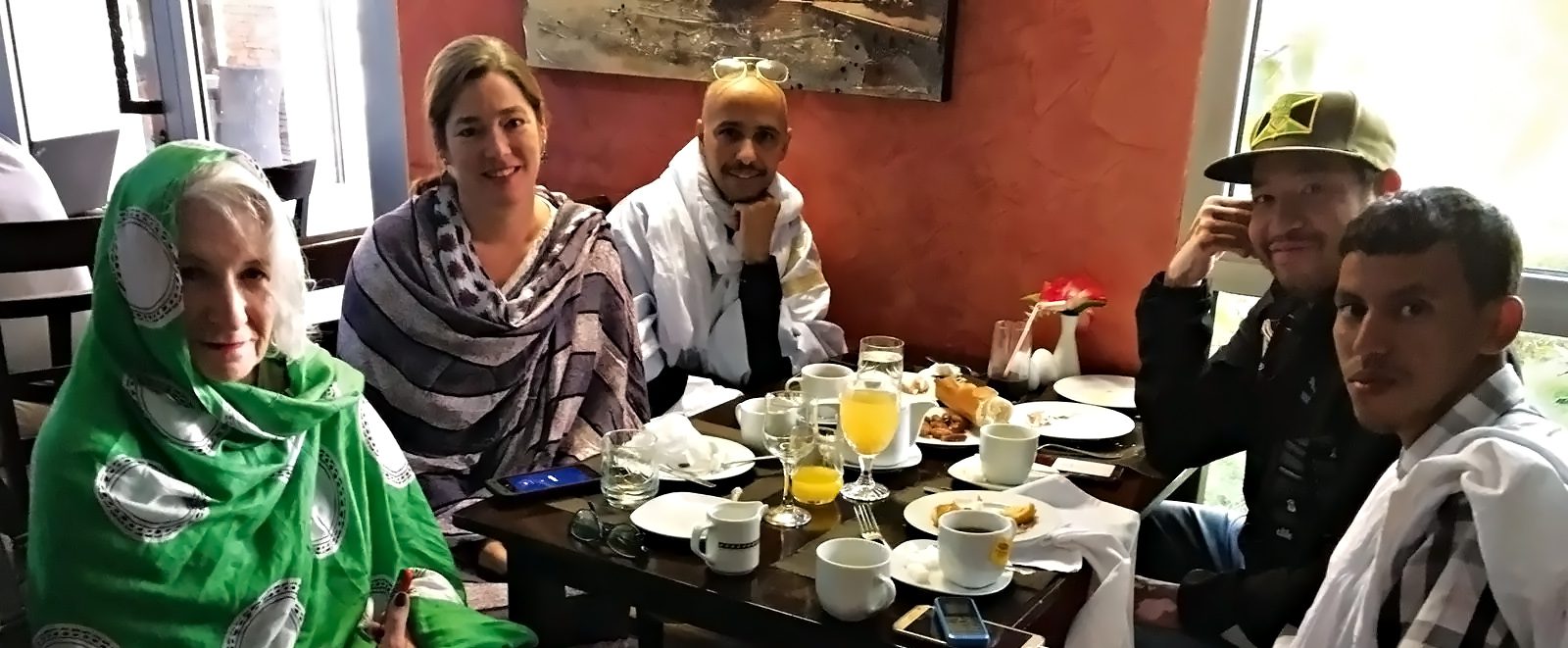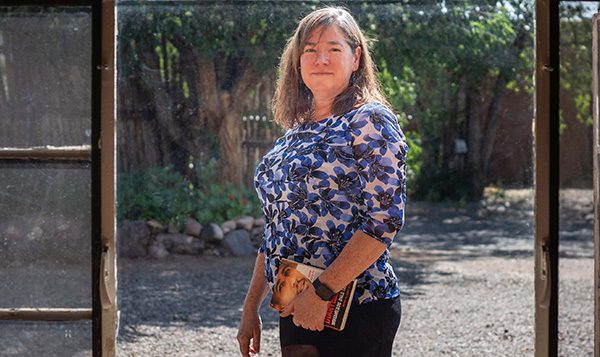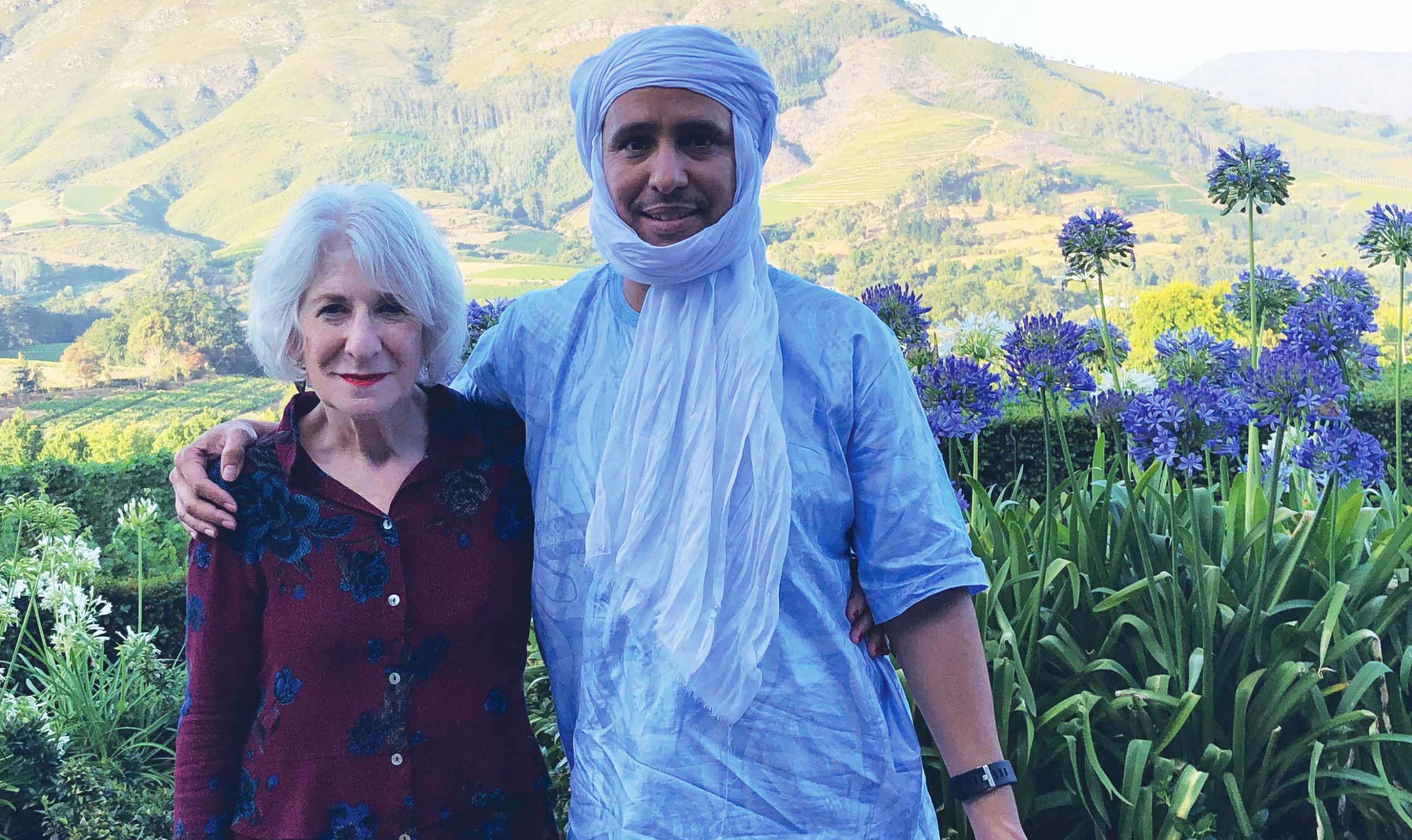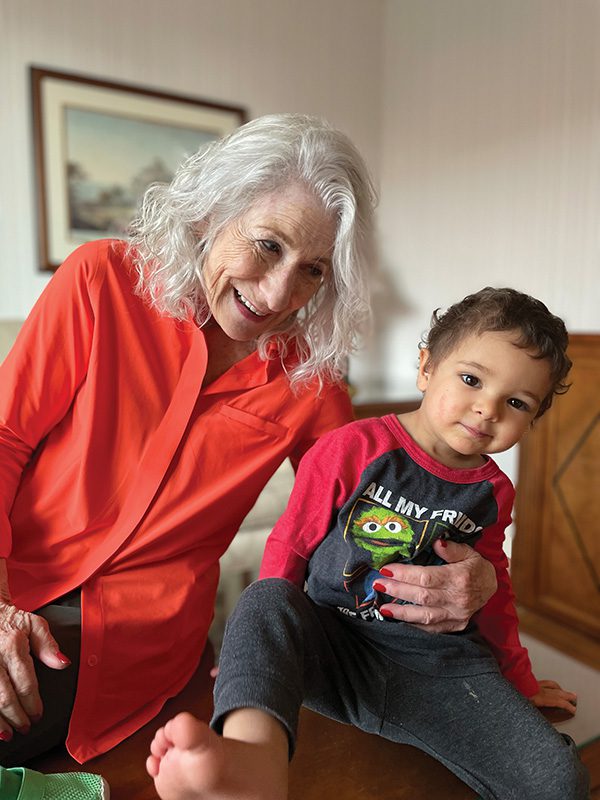
Fierce Defenders: UNM alumnae take on tough legal cases and unpopular clients
In the film The Mauritanian, which won Jodie Foster a best supporting actress Golden Globe award this year, Foster plays attorney Nancy Hollander and Shailene Woodley plays attorney Teri Duncan, colleagues at an Albuquerque law firm who take on a habeas corpus case for Mohamedou Salahi, a Bedouin electrical engineer accused of being an Al Qaida recruiter and terror plot mastermind, who was imprisoned and tortured by American soldiers at Guantanamo Bay, Cuba.
Their work led a federal judge to order Salahi released from the government’s “black site” at Guantanamo after being held there without charges for seven years. Salahi stayed imprisoned for another seven years while the government appealed and was finally freed in 2016.
Both received their law degrees from UNM – Hollander in 1978 and Duncan in 2000.
The film tells only a slice of each woman’s distinguished career. Driven to uphold the Constitution even when it’s inconvenient, both have taken on unpopular cases and defended some of the most vilified defendants in the American legal system.
Theresa Duncan
If it weren’t for a few twists of fate, Theresa “Teri” Duncan might have been a prosecutor instead of one of the nation’s most respected defenders of people facing the federal death penalty.

Teri Duncan is based in Santa Fe but works on appellate cases throughout the nation. Photo: Roberto E. Rosales (’96 BFA, ’14 MA)
After coming to St. John’s College in Santa Fe from Rhode Island, Duncan fell in love with New Mexico and stayed after she graduated from college, working as a grant writer for nonprofits in Santa Fe. She loved helping social causes she cared about but wanted a career that would allow her to more directly make a difference.
She picked law school and enrolled at UNM.
Why law?
“My mother says I came out of the womb arguing,” Duncan says.
It may come a surprise, but Duncan says, “I actually went into law school thinking I would be a prosecutor.” She had volunteered in development for the Santa Fe Rape Crisis Center and was interested in prosecuting as a way of defending people who were the victims of violence.
But the summer after her first year of law school she shadowed a public defender for a few days and found her niche. “From then on,” she says, “I was a hard-core criminal defense lawyer and never looked back.”
Duncan took special interest in the social and psychological underpinnings of criminal behavior, finding insight into the ways childhood trauma is associated with criminal behavior.
“I came to understand that there really are two sides to every story, that people who are charged with criminal offenses have very complicated backgrounds,” she says.
She cites as an example John McCluskey, who was charged with carjacking and murdering a couple traveling in their RV from the Midwest to Colorado. McCluskey was big and tattooed, an escaped convict with a hefty rap sheet when he grabbed the couple.
“When I met him, he presented himself as this dangerous tough guy, consistent with the “monster” the media portrayed him as,” says Duncan, who defended McCluskey against the death penalty. “By the end of the case,” she says, “I understood he was this incredibly complicated, kind and connected human being who was, of course, terribly flawed. There was no excuse for what he did, but I came to understand why he did what he did. People are sometimes surprised to hear this, but I really like my clients.”
With each client, Duncan has gotten a little closer to understanding human nature. It may come as a surprise that spending two decades involved with people accused of grisly murders has brightened Duncan’s outlook.
“I feel better as a human being having reached the conclusion that there is no evil. As Rudolfo Anaya writes in Bless Me, Ultima, there is no such thing as evil, there are just things we don’t understand.”
After law school Duncan clerked for New Mexico Court of Appeals Judge Lynn Pickard and then joined the Public Defender’s Office. She was torn between two job openings – one in the appellate division in Santa Fe and the other in the juvenile division in Albuquerque. When her car broke down and commuting to Albuquerque was off the table, she took the appellate job.
Duncan was still green when the opportunity arose to join the legal team defending Terry Nichols, accused of conspiring with Timothy McVeigh to blow up the federal building in Oklahoma City in 1995 and killing 168 people. In separate trials in federal court, McVeigh was found guilty of murder, conspiracy and using a weapon of mass destruction and was sentenced to death. Nichols, who was not physically in Oklahoma on the day of the bombing, was found guilty of conspiracy and involuntary manslaughter, but spared the death penalty when the jury deadlocked. He was sentenced to life in prison. The state of Oklahoma then charged Nichols with 160 counts of murder and sought the death penalty.
Duncan had just started dating Mark Earnest, a colleague in the Public Defender’s Office who defended capital crimes, when UNM law Prof. Barbara Bergman, who was on Nichols’ defense team, asked Earnest to help her as an investigator and Duncan to help her with writing motions. One of Earnest and Duncan’s first dates had been a trip to the prison in Hobbs to interview a witness in a murder case, so it wasn’t a stretch for the two to pack up and move to Oklahoma for a year and a half to defend a man who was accused of the country’s most deadly domestic terrorist attack.
Even though Nichols had been tried in federal court, the new legal team started over, spending over a year investigating his involvement in the bomb making and spending months in trial. It was a valuable learning experience for Duncan and it solidified the Duncan-Earnest relationship. They married and now own a law practice, Duncan Earnest, in Santa Fe.
Nichols was found guilty of all 160 murder charges, but the jury again deadlocked on the death penalty and he was sentenced to life in prison.
Duncan then joined the law firm now known as Freedman, Boyd, Hollander, Goldberg, Urias & Ward, where she teamed with Hollander when a court ruled that Guantanamo prisoners had rights to legal counsel.
The character in The Mauritanian played by Woodley is named Teri Duncan, but is based on several lawyers on the team. “There were a lot of people working on the case and there was some good drama on the team, so rather than add a whole group of lawyers they consolidated it all into me,” Duncan says.
Duncan speaks French in the movie; she doesn’t in real life. She is portrayed as wide-eyed, innocent and fragile, and in one scene, Hollander fires Duncan when Duncan sees some troubling evidence that disturbs her.
“The one way I was really naive,” Duncan says, “was in my faith in the federal government. I knew that our government had done horrible, horrible things over the centuries but I was one of those Americans who thought that was all in our past. As we learned about Mohamedou’s case and the black sites, I was shocked. It’s made me a better lawyer because I no longer take the government at its word the way I used to.”
From a filmmaking standpoint, Duncan understands that her character is a relatable foil to Hollander’s strong, almost heroic, persona. “And,” she says, “I think my character personifies the question, ‘How do you represent someone who society sees as a monster?’ My character provides a passageway for the audience to overcome their skepticism, to get to know Mohamedou as a human being and ultimately to care about him and what happened to him.”
She isn’t too worried about the big screen Teri Duncan overshadowing the real-life one.
“I think fortunately that the people who know me, know me,” she says. “A lot of lawyers I’ve worked with over the years say, ‘I loved the movie but that’s not the Teri Duncan I know.’ And of course Shailene Woodley is amazing, so to be able to say you’re played by Shailene Woodley is absolutely fabulous.”
An aspect of The Mauritanian that rings very true, according to Duncan, is the bond she and Hollander forged with Salahi. And Duncan credits the UNM School of Law with helping that along.
“Because of the diversity of UNM’s faculty, students and curriculum I learned the importance of culture and understanding culture in representing people,” Duncan says.
She and Hollander learned about Islam and world history from Salahi’s perspective, connected with him as a person and because of that were able to represent him better.
Knowing and representing Salahi also taught Duncan about compassion.
“He’s such a compassionate human being and so forgiving. Watching him interact with the guards and maintain a sense of dignity and compassion, I became more compassionate,” she says.” It’s challenging to feel self-righteous and entitled when someone like Mohamedou is wrongly imprisoned in Guantanamo, brutally tortured and is still kind and respectful to the people who wronged him.”
Duncan, who decompresses by walking her dogs and hiking in the forest outside Santa Fe, tries cases with literally life and death consequences for her clients.
“It’s a struggle,” she acknowledges. “I’m fortunate to have people in my personal life and my professional life who are supportive of me and who I can reach out to when it feels too heavy. I do have to stay after my mental health. There have been times and there will be times in the future when it almost feels like too much.”
Nancy Hollander
The first time Nancy Hollander got arrested, she was 17, a pre-med freshman at the University of Michigan refusing to move at a sit-in for fair housing at Ann Arbor’s city hall.

Nancy Hollander with Mohamedou Salahi. Photo: Courtesy Nancy Hollander
Three years later, she was arrested again during an anti-apartheid sit-in on Wall Street. After graduating from Michigan, Hollander moved to Chicago and was arrested for her third – and last – time while she was taking pictures of police at City Hall during a demonstration.
Since fleeing a chaotic marriage with her toddler son and taking off for Albuquerque with nothing besides their clothes and her cameras, Hollander dropped the idea of becoming a doctor, earned a law degree and has used it for more than 40 years in the defense of civil rights, the rule of law and some famously unpopular criminal defendants.
The theme of her career has been standing up to authority.
“I don’t do well with authority,” Hollander says. She traces her rebellious streak to her parents – her father, a labor organizer in his youth, and her mother, a feminist who rose to be vice president at a major publishing company.
“My mother taught me at a young age to be a feminist,” Hollander says. Growing up in Dallas, Hollander was in elementary school when her mother handed her Henrik Ibsen’s critique of the patriarchy, “A Doll’s House,” and said, “Read this. It will make you a feminist.”
When Hollander landed at Michigan she quickly joined a student activism group that would become a chapter of Students for a Democratic Society and became its president, introducing Malcolm X at a campus event.
When she found herself in Albuquerque, working for the New Mexico Civil Liberties Union and looking for another career, she found her life’s calling in law school.
“The only thing I wanted to do was criminal defense work,” says Hollander. “I never was interested in anything else. I like to say I’ve been fighting the government since I was 17 and got arrested in Ann Arbor, but now sometimes I get paid to do it.”
After 14 months with the Public Defender, Hollander joined what was then Freedman, Boyd and Daniels and quickly became a national name.
She, along with others in the firm, defended Wen Ho Lee, a Los Alamos National Laboratory mechanical engineer who was accused in 1999 of stealing nuclear secrets and giving them to China. After he was held in solitary confinement for nearly a year, the government’s case crumbled and all but one of the charges were dropped in 2000. As part of a settlement, he pled guilty to improper handling of restricted data. The judge overseeing the case apologized to Lee for the way the case had been handled.
That same year, Hollander sued the government on behalf of União do Vegetal, a Brazil-based religious organization with congregations in New Mexico after customs agents seized hoasca tea, which contains a small amount of an illegal hallucinogen. In 2006, the U.S. Supreme Court ruled in favor of União do Vegetal, affirming its members’ right to use the tea as a sacrament.
Hollander teamed with Duncan to defend a top official of the Holy Land Foundation, the largest Muslim charity in the country, against federal charges the charity conspired to support Palestinian militant group Hamas.
She and partner Vince Ward (’01 JD) handled Army Private Chelsea Manning’s appeal of her court martial and sentence of 35 years in military prison under the Espionage Act for disclosing thousands of military documents to WikiLeaks, and also represented Manning in her appeal for clemency, which President Obama granted, commuting Manning’s sentence in 2017 after she had spent seven years in prison.
And she and Duncan had earlier, in 2005, teamed to take on the habeas corpus case of Mohamedou Salahi, held in Guantanamo, Cuba, by U.S. authorities under suspicion of terrorism.
Hollander and Duncan traveled frequently to Guantanamo to meet with Salahi and another of their clients, Abd Al-Rahim Al-Nashiri, a Saudi/Yemeni who is alleged to have been the mastermind behind the bombing of the U.S.S. Cole.
In 2010, Hollander wrote an op-ed for the International Herald Tribune titled “A Terrorist Lawyer, and Proud of It,” in which she defended herself and other attorneys who represented those imprisoned at Guantanamo.
While Hollander has grown a thick skin against criticism during her decades defending people accused of horrible crimes, it was the suggestion that lawyers who defend terrorism suspects are disloyal to the country that pushed Hollander to speak out.
“Contrary to recent attacks by those who claim to be supporters of American justice, my defense of people accused of serious and sometimes horrific crimes is not an endorsement of those crimes,” she wrote. “Rather, it is a testament to the strength of my belief in, and commitment to, the American system of justice.”
Hollander now handles al-Nashiri’s cases only in foreign courts including the European Court of Human Rights and the International Criminal Court, which means she no longer travels to Guantanamo.

Hollander with Ahmed Salahi, Mohamedou Salahi’s son and her godson.
“For me, she says, “it has been a bit of a blessing. I hated going there. I hated leaving Mohamedou. We’d walk out and we’d hug. I’d start crying. He’d said, ‘No, don’t cry.’ I just hated leaving him there.”
While handling Salahi’s habeas corpus case, Hollander and Duncan also fought to get the memoir he had written while at Guantanamo released so it could be published. “Guantanamo Diary” was published in 2015 and was the basis for the film, The Mauritanian.
Hollander and Duncan negotiated film rights to the book and while it was in development Hollander thought about who might play her if the movie ever came to screen.
“People tell me sometimes that I look like Helen Mirren when my hair’s short,” Hollander says. “Then, all of a sudden it was Jodie (Foster) and I said, ’Wow!’”
Foster’s Hollander character has some aspects taken directly from the real-life Hollander: the bright red fingernails, the fast cars and a curt demeanor.
Other aspects are fiction, notably Foster’s wigs of steel-gray helmet hair and her absence of a sense of humor.
“I’m the first living real person she’s played,” Hollander notes. “She wrote to me and she said (the portrayal) will be some of you and some of me. And it wasn’t an impersonation. I think she’s meaner than I am. I think she’s harsher than I am. (Although some of my friends would disagree with that.) I’ve gotten used to it now because I’ve seen the movie so many times. But it was just an odd feeling to see someone else being me.”
Foster, in an interview with Deadline, the entertainment industry news site, said, “I always say, even though I dress like her in the movie, and we look a little bit alike, the real Nancy is a lot nicer than my Nancy. No, way nicer.”
When the movie was released, Hollander did weeks of Zoom press interviews. She was at home watching the Golden Globes ceremony on TV when Foster won the best supporting actress award.
“And I thought if it hadn’t been for COVID, I’d be somewhere with her in a fancy dress,” Hollander says.
Despite her international acclaim, Hollander still describes herself as “a down-in-the-dirt criminal defense lawyer.”
She moved to New York about three years ago to make international travel more convenient. She sold her condo in Albuquerque and all of her furniture and shipped her BMW to Florida to be inherited by a teenage granddaughter.
“I don’t own anything,” says Hollander, who rents an apartment on the Upper West Side and stays with a friend when she comes to Albuquerque to work and visit her standard poodle Luna, who she co-parents with a friend. She is also perhaps the only woman in Manhattan who comes to Albuquerque to get her hair done, returning for cuts to her longtime stylist Roberto Vasquez.
At 77, Hollander is less of a trial warrior these days.
“I don’t want to have to go to court. Trials are really stressful,” she says. “I’ll do cases – edit briefs, maybe argue some things. I have trouble with the word retirement. I don’t like it. I like to say that I’m changing. “
